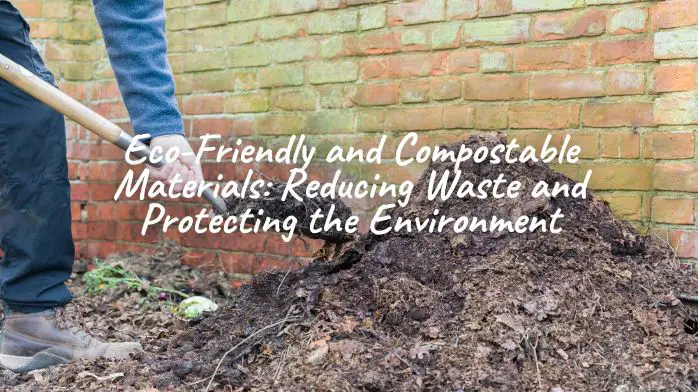Not all eco products are compostable. Eco-friendly products are designed to have a minimal environmental impact, which can be achieved through various means.
Some eco-friendly products are made from natural, biodegradable materials that can be composted. In contrast, others may be made from recycled materials or have a longer lifespan, reducing the need for replacement and waste. It’s important to read the labels and packaging of eco-friendly products to understand their specific characteristics and how to dispose of them properly.
Compostable Eco-Friendly Materials
Many materials are eco-friendly and compostable. Here are a few examples:
- Bioplastics: These are plastics made from renewable resources such as corn starch or potato starch, and they can be composted in industrial composting facilities.
- Wood: untreated wood can be composted, although it may take longer to break down than other materials.
- Paper and cardboard: These materials can be composted, but it’s important to avoid any that have been treated with chemicals or inks.
- Natural fibers: Materials such as cotton, wool, and hemp can be composted.
- Food waste: Fruit and vegetable scraps, coffee grounds, and tea leaves can all be composted.
Not all compostable materials will break down at the same rate, and some may require industrial composting facilities to break down fully. It’s also important to follow local guidelines for composting to ensure that materials are disposed of properly.

Bioplastics
Bioplastics are plastics made from renewable resources such as corn starch, potato starch, or sugarcane, rather than fossil fuels. They can make many products, including packaging materials, disposable cutlery and straws, and even automotive parts.
One of the main benefits of bioplastics is that they are biodegradable, meaning natural processes can break them down into materials that are not harmful to the environment. This makes them a more sustainable alternative to traditional plastics, which can take hundreds of years to break down and contribute to pollution and waste.
Bioplastics can be composted in industrial composting facilities, but it’s important to note that not all bioplastics are created equal. Some bioplastics may break down faster than others, and some may require special conditions to decompose properly. It’s also important to check with local authorities to see what types of bioplastics are accepted for composting in your area.
Wood
Wood is a natural, renewable resource used for centuries in various applications. It is commonly used in construction, furniture, paper production, and as a fuel source.
Untreated wood is biodegradable, which means natural processes can break it down into materials that are not harmful to the environment. This makes it a sustainable alternative to materials such as plastic, which can take hundreds of years to break down and contribute to pollution and waste.
Wood can be composted, but it may take longer to break down than other materials, such as paper or food waste. The rate at which wood decomposes depends on several factors, including the type of wood, the size and thickness of the pieces, and the compost pile conditions. In general, wood will decompose more quickly in a hot, moist environment with a balance of carbon and nitrogen materials.
It’s important to note that wood treated with chemicals or preservatives may not be suitable for composting. It’s also important to follow local guidelines for composting to ensure that wood is disposed of properly.
Paper and Cardboard
Paper and cardboard are made from wood fibers and are commonly used for packaging, printing, and writing. They are biodegradable and can be composted, making them a more sustainable alternative to materials such as plastic, which can take hundreds of years to break down and contribute to pollution and waste.
To be composted, paper and cardboard should be free of chemicals or inks. They can be added to a compost pile along with food waste and other organic materials, where they will break down over time. The rate at which paper and cardboard decompose depends on several factors, including the type of paper, the size and thickness of the pieces, and the compost pile conditions. Generally, paper and cardboard decompose more quickly in a hot, moist environment with a balance of carbon and nitrogen materials.
It’s important to follow local guidelines for composting to ensure that paper and cardboard are disposed of properly. Some communities may have specific requirements for the type or amount of paper and cardboard that can be added to a compost pile.
Natural Fibers
Natural fibers are materials produced by plants or animals and can be used to make a wide range of products, including clothing, textiles, and paper. Some examples of natural fibers include cotton, wool, and hemp.
Natural fibers are biodegradable, which means natural processes can break them down into materials that are not harmful to the environment. This makes them a more sustainable alternative to synthetic fibers, which are made from petroleum products and take a long time to break down.
Natural fibers and other organic materials can be composted, such as food waste and yard trimmings. The rate at which natural fibers decompose depends on several factors, including the type of fiber, the size and thickness of the pieces, and the compost pile conditions. In general, natural fibers will decompose more quickly in a hot, moist environment with a balance of carbon and nitrogen materials.
It’s important to follow local guidelines for composting to ensure that natural fibers are disposed of properly. Some communities may have specific requirements for the type or amount of natural fibers that can be added to a compost pile.
Food Waste
Food waste is organic material that is discarded or not used. It can include fruit and vegetable scraps, coffee grounds, and eggshells. Food waste is a major contributor to pollution and waste, as it takes up space in landfills and produces methane, a potent greenhouse gas, as it decomposes.
One way to reduce the impact of food waste is to compost it. Composting is the process of breaking down organic materials into a soil-like substance called compost, which can be used to enrich the soil and improve plant growth. Food waste can be added to a compost pile along with yard trimmings and other organic materials, where it will break down over time.
The rate at which food waste decomposes depends on several factors, including the type of food, the size and thickness of the pieces, and the compost pile conditions. Generally, food waste will decompose more quickly in a hot, moist environment with a balance of carbon and nitrogen materials.
It’s important to follow local guidelines for composting to ensure that food waste is disposed of properly. Some communities may have specific requirements for the type or amount of food waste that can be added to a compost pile.
Conclusion
Many materials are eco-friendly and compostable, including bioplastics, wood, paper and cardboard, natural fibers, and food waste. Natural processes can break these materials into materials that are not harmful to the environment, reducing waste and pollution. It’s important to read labels and packaging to understand the specific characteristics of eco-friendly products and to follow local guidelines for composting to ensure that materials are being disposed of properly.

